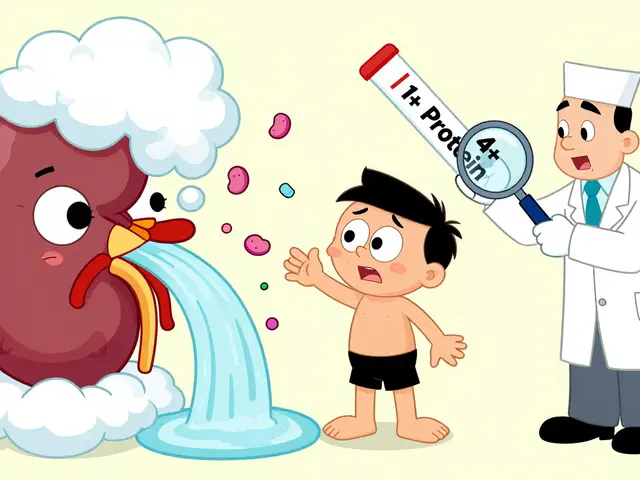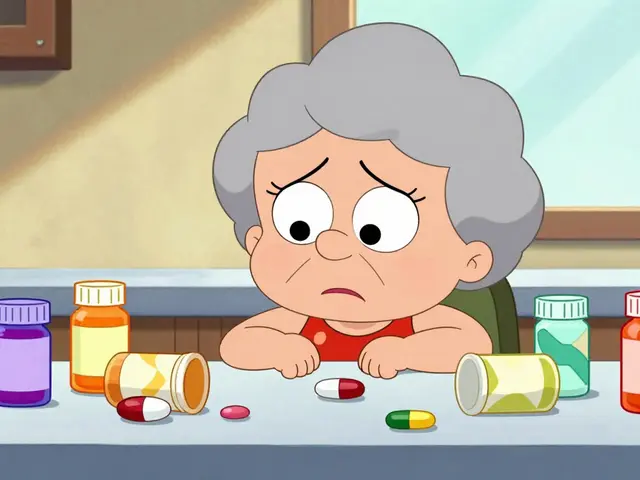Increased thirst and headaches are common complaints that many of us experience from time to time. While they can be isolated incidents, it's important to understand that they can also be interconnected symptoms indicating a deeper issue.
Let's delve into the causes and explore the possible reasons behind these uncomfortable experiences. We will also share some practical tips to help manage them and highlight when it might be necessary to consult a healthcare professional.
- Causes of Increased Thirst
- Common Reasons for Headaches
- The Connection Between Thirst and Headaches
- Tips to Manage Thirst and Headaches
- When to See a Doctor
Causes of Increased Thirst
Feeling thirsty more often than usual? It's not just about being dehydrated after a hot day. There are several important reasons why someone might experience increased thirst.
First off, dehydration is one of the most common causes. When our body loses more fluids than it takes in, it triggers the thirst mechanism to encourage us to drink more. This can happen due to excessive sweating, diarrhea, vomiting, or not drinking enough water.
Another significant cause is diabetes. Both Type 1 and Type 2 diabetes can lead to higher blood sugar levels, making kidneys work harder to filter and absorb the excess sugar. This results in more frequent urination, which subsequently causes increased thirst to replenish the lost fluids. It’s not uncommon for this symptom to be one of the early signs of diabetes, so it should not be ignored.
Medications are also worth considering. Some drugs, like diuretics (often prescribed for high blood pressure), have side effects that can make you feel thirsty. It’s always a good idea to check with your doctor if you notice this symptom after starting a new medication.
Other health conditions, such as kidney problems and autoimmune diseases like Sjögren's Syndrome, can also contribute to persistent thirst. Kidneys play a crucial role in regulating fluid and electrolyte balance. When they’re not functioning properly, you may feel the need to drink more water to compensate.
For pregnant women, increased thirst can be quite normal, especially as the body needs more fluids to support the growing baby and increased blood volume. However, it's essential to monitor this symptom to ensure it’s not a sign of gestational diabetes.
According to Dr. Mark Hyman, a well-respected functional medicine advocate, "Understanding the root cause of increased thirst is essential since it’s your body’s way of telling you something isn’t right."
In some cases, an unusually high salt intake can also lead to increased thirst. When you consume salty foods, your body needs more water to balance the salt levels within your cells. This can lead you to reach out for more fluids than you usually would.
Finally, lifestyle factors such as a high-protein diet, strenuous exercise, or living in hot climates can naturally prompt you to drink more water. Your body’s increased demand for fluids in these situations is a normal response to maintaining optimal hydration levels.
Understanding these causes can help you pinpoint why you might be feeling unusually thirsty and take appropriate action. If you’re ever in doubt, consulting with a healthcare professional can provide clarity and ensure you’re taking the right steps for your health.
Common Reasons for Headaches
Headaches are a universal experience, often causing a significant impact on daily activities. There are many reasons why someone might develop a headache, ranging from lifestyle factors to more serious health conditions. One of the most common causes is tension headaches, usually triggered by stress, anxiety, or muscle strain. People often report a feeling of band-like pressure around their heads.
Migraines are another frequent reason for headaches. These can be more severe and are often accompanied by other symptoms such as nausea, vomiting, and sensitivity to light and sound. Genetics play a role in migraines, meaning they can run in families. Environmental factors like bright lights, loud noises, and certain foods can trigger migraines.
Dehydration is a less obvious but common cause of headaches. When the body lacks adequate water, it can lead to reduced blood flow and oxygen to the brain, causing headache pain. This type of headache can often be resolved by drinking water and staying hydrated. Poor posture and eye strain, especially from long hours on screens, are other lifestyle factors that lead to headaches.
Interestingly, caffeine can play a dual role. For some, it relieves headaches, particularly migraines, due to its ability to constrict blood vessels. For others, especially with overuse, it can lead to rebound headaches. It’s important to monitor caffeine intake to understand its effect on headache patterns.
According to Dr. John Smith, a neurologist at University Hospital, "Understanding the underlying cause of headaches is crucial. While lifestyle changes can alleviate some headaches, persistent or severe pain should be evaluated by a medical professional."
Sleep issues, including both lack of sleep and oversleeping, can also contribute to headaches. Regular sleep patterns help maintain brain health and prevent headaches. In some cases, headaches can be a symptom of more serious conditions such as hypertension, sinus infections, or even more severe medical issues.
Lastly, diet plays a significant role in headache frequency and intensity. Certain foods can trigger headaches in some individuals, including processed meats, aged cheeses, and foods containing monosodium glutamate (MSG). Keeping a food diary may help identify and avoid personal headache triggers.
The Connection Between Thirst and Headaches
Most people tend to overlook the connection between increased thirst and headaches, attributing them to different causes. However, these two symptoms often share a common root, making it essential to understand how they interact.
Dehydration is one major common cause that links both these unpleasant sensations. When the body is dehydrated, it triggers a thirst mechanism to signal the need for water. Simultaneously, even mild dehydration can affect the brain, reducing its volume and causing it to pull away from the skull. This can result in significant pain or headaches.
“Even a 2% drop in hydration levels can result in headaches,” says Dr. John Smith, a leading neuroscientist from the Health Research Institute.
Another crucial aspect lies in the role of electrolytes. Our bodies need a proper balance of electrolytes – such as sodium, potassium, and magnesium – to function well. Imbalances in these vital minerals often occur when we are dehydrated, which can lead to neurological symptoms, including headaches. For example, low sodium levels, also known as hyponatremia, can directly trigger migraines or severe headaches.
For those suffering from diabetes, increased thirst and headaches can be particularly telling. High blood sugar levels, a hallmark of diabetes, lead to frequent urination, which in turn causes dehydration and a constant sense of thirst. The lack of adequate fluid levels can cause blood vessels in the brain to narrow, resulting in headache. Keeping blood sugar levels in check is crucial for managing these symptoms.
Hormonal fluctuations also play a significant role in linking thirst and headaches. Hormones like aldosterone regulate the balance of fluids and electrolytes in the body. When there are hormonal imbalances, such as during menstruation or menopause, women might experience increased thirst coupled with headaches. These cycles can exacerbate dehydration, making headaches more frequent.
Additionally, certain medications can side effects that include both increased thirst and headaches. Diuretics, for instance, are medications that aim to remove excess fluid from the body. While effective, they can lead to dehydration if not managed properly. Similarly, medications for blood pressure and depression often list these symptoms among their potential side effects.
Recognizing the link between these symptoms can help individuals take the necessary steps to remedy the situation. Drinking adequate water, monitoring electrolyte levels, and maintaining a balanced diet can prevent and alleviate these conditions. Understanding one's hormonal cycles and managing relevant medications is also integral in preventing the combined onslaught of thirst and headaches.
More than just a nuisance, the connection between thirst and headaches can often indicate more serious underlying conditions. As such, a proactive approach—understanding what triggers these symptoms, recognizing their link, and taking preventive measures—can significantly improve quality of life. When symptoms persist, consulting a healthcare professional is essential to ensure there isn’t a more serious underlying cause.
Tips to Manage Thirst and Headaches
Dealing with increased thirst and headaches can be challenging, especially when they occur together. Here are some practical tips to help alleviate these symptoms and improve your quality of life.
Stay Hydrated: One of the most common causes of increased thirst and headaches is dehydration. Make sure you drink enough water throughout the day. The old rule of drinking eight glasses of water a day is a good starting point, but individual needs can vary based on factors like age, weight, and activity level. Keep a water bottle handy to remind yourself to drink regularly.
Eat Hydrating Foods: Incorporating hydrating foods into your diet can also help. Foods like cucumbers, watermelon, strawberries, and oranges have high water content and can contribute to your daily hydration needs. Salads, soups, and smoothies are great ways to add these foods to your meals.
Limit Caffeine and Alcohol: Both caffeine and alcohol can contribute to dehydration, leading to increased thirst and headaches. Try to limit your intake of these drinks. If you do consume them, ensure you drink plenty of water to offset their dehydrating effects.
Monitor Blood Sugar Levels: Especially if you have diabetes or are at risk, it's important to keep an eye on your blood sugar levels. Both high and low blood sugar can cause increased thirst and headaches. Consuming a balanced diet with complex carbohydrates, proteins, and healthy fats can help maintain stable blood sugar levels.
Exercise Regularly: Physical activity can help improve your overall health and well-being, potentially reducing headache frequency. However, remember to stay hydrated before, during, and after exercise to avoid dehydration.
Get Enough Sleep: Lack of sleep is a well-known trigger for headaches and can also affect your body's hydration levels. Aim for 7-9 hours of sleep per night to help maintain your health. Establish a consistent sleep routine and create a relaxing environment to promote better sleep.
Practice Stress Management: Chronic stress can contribute to both headaches and increased thirst. Techniques such as deep breathing exercises, yoga, meditation, and even spending time with loved ones can help you manage stress effectively.
If you're still struggling with these symptoms despite making these lifestyle adjustments, it may be time to consult a healthcare professional. Persistent or severe thirst and headaches can sometimes indicate more serious conditions that require medical attention.
When to See a Doctor
It's often a judgment call when deciding whether your symptoms are serious enough to warrant a visit to the doctor. However, there are certain times when increased thirst and frequent headaches should not be ignored. If you're experiencing persistent symptoms that aren't relieved by drinking more water or over-the-counter pain medications, it might be a sign of an underlying condition that needs medical attention.
One red flag to look out for is if your thirst and headaches are accompanied by other symptoms such as unexplained weight loss, frequent urination, blurred vision, or fatigue. These could be signs of diabetes, which is a serious condition that requires proper diagnosis and management. According to the American Diabetes Association, increased thirst and frequent urination are some of the first symptoms of diabetes.
If you notice symptoms such as extreme thirst or unusual headaches that persist for more than a few days, it's important to consult with a healthcare provider to rule out any serious conditions.
Another scenario to be aware of is if your headaches are unusually severe or different from what you usually experience. If you have a headache that feels like the worst headache you've ever had, or if it comes on suddenly and is very intense, it could be a sign of something more serious like a migraine, cluster headache, or even a brain aneurysm. These conditions require immediate medical attention to prevent complications.
If you have a history of health conditions such as kidney disease, it is essential to see a doctor if you experience sudden changes in your thirst levels. Kidneys play a crucial role in regulating fluids in the body, and any dysfunction can lead to increased thirst. Chronic kidney disease can also cause buildup of waste in the blood, leading to headaches.
In children, signs of severe thirst and headaches should be taken seriously as well. Dehydration in children can escalate quickly. Look out for symptoms like dry mouth, sunken eyes, or a decrease in the frequency of urination. If these symptoms are present, it may be best to visit a healthcare professional to ensure the child remains healthy and hydrated.
Pregnant women also need to be cautious. Increased thirst and frequent headaches could be indicators of gestational diabetes, which can have serious implications for both mother and baby. Regular prenatal check-ups are essential to monitor the health of both, but don't hesitate to bring up any concerns with your healthcare provider.
For anyone experiencing these symptoms along with confusion, dizziness, or fainting, it’s crucial to seek emergency medical care. These could be signs of severe dehydration or other critical conditions that require immediate intervention.
If you fall under any of these categories or simply feel that your symptoms are unusual or worrying, don’t hesitate to reach out to a healthcare professional. Early diagnosis and treatment can make a significant difference in managing any potential underlying issues and ensuring better health.

 App-Based Prescribing: Best Platforms for Getting Generic Medications in 2025
App-Based Prescribing: Best Platforms for Getting Generic Medications in 2025
 Why American Mistletoe is the Perfect Addition to Your Daily Supplement Routine
Why American Mistletoe is the Perfect Addition to Your Daily Supplement Routine
 Nephrotic Syndrome: Understanding Heavy Proteinuria, Swelling, and Real Treatment Options
Nephrotic Syndrome: Understanding Heavy Proteinuria, Swelling, and Real Treatment Options
 Wellbutrin Sr Prescription Online: Comprehensive Guide to Bupropion Treatment
Wellbutrin Sr Prescription Online: Comprehensive Guide to Bupropion Treatment
 Medication Safety at Home: A Step-by-Step Guide to Preventing Errors
Medication Safety at Home: A Step-by-Step Guide to Preventing Errors
Emily Wagner
May 16, 2024 AT 16:30When you sip water you’re not just quenching a bodily urge – you’re engaging in a tiny ritual of self‑care that mirrors the mind‑body dialogue. The thirst‑headache connection is a classic feedback loop: dehydration shrinks brain tissue slightly, tugging at the skull and sending pain signals. Think of it as the body’s way of shouting, "Hey, don’t ignore the signal!" In plain terms, keep a bottle handy and treat that whisper as a command.
Mark French
May 16, 2024 AT 16:35Indeed, the physiological mechanisms you described are well‑documented, though it is worth noting that occasional oversights in hydration can exacerbate symptomatic expression. Apologies for any misspelling herein, but the crux remains: regular fluid intake mitigates headache incidence.
Daylon Knight
May 16, 2024 AT 16:40Oh great, another post telling me to drink water, because I was totally clueless about that.
Jason Layne
May 16, 2024 AT 16:45While the surface advice appears innocuous, consider the hidden agenda of the water industry, which profits from our perpetual thirst. The narrative that simple hydration solves complex headaches conveniently diverts attention from pharmaceutical monopolies. Moreover, the electrolytes we ingest are often sourced from regions with dubious mining practices, fueling geopolitical tension. In short, the "drink more water" mantra is a carefully crafted distraction.
Hannah Seo
May 16, 2024 AT 16:50From a clinical standpoint, the recommendations are solid. Ensuring adequate hydration, especially during exercise or in hot climates, reduces the likelihood of vasoconstriction‑induced pain. Additionally, incorporating electrolyte‑rich foods can balance sodium and potassium levels, further preventing headache triggers. If symptoms persist despite these measures, a professional evaluation is advisable to rule out underlying conditions such as diabetes or hypertension.
Victoria Unikel
May 16, 2024 AT 16:55i get that staying hydrated helps but its hard when you feel like urinating all the time lol. still trying to find a balance.
Lindsey Crowe
May 16, 2024 AT 17:00Wow, groundbreaking insight: water might stop headaches. Who would've thought?
Rama Hoetzlein
May 16, 2024 AT 17:05Honestly, the article is spot‑on – drink water, watch electrolytes, and you’ll feel better 😊. Too many people ignore the simple fixes while chasing expensive meds. Keep that bottle close, and you’ll thank yourself later.
Lorena Garcia
May 16, 2024 AT 17:10I'm curious about how different cultures address thirst‑related headaches. Some traditions use herbal teas, others emphasize salt intake. It would be great to compare these practices.
Dietra Jones
May 16, 2024 AT 17:15Nice points! Just a heads‑up: "it's" should be "its" in the second sentence, but otherwise looks good.
Victoria Guldenstern
May 16, 2024 AT 17:20The intricate dance between aqueous homeostasis and cephalic discomfort unfolds as a testament to the body's relentless pursuit of equilibrium; when the plasma viscosity drifts beyond the narrow corridor of optimal osmolarity, neuronal cells react with a cascade of electrochemical signals that manifest as pulsating pain in the cranial vault. In this context, the skull, a rigid bony encasement, offers no room for volumetric expansion, thereby translating even minute shifts in intracellular fluid into perceivable throbbing sensations. Moreover, the hypothalamic osmoreceptors, perched like vigilant sentinels, constantly gauge solute concentration, prompting thirst drives whenever deviations exceed a marginal threshold. The resultant psychological impetus to ingest fluids serves not merely a quenching function but operates as a corrective feedback loop aimed at restoring the delicate balance between intracellular and extracellular compartments. Failure to heed this cry precipitates a cascade wherein cerebral blood flow diminishes, aggravating nociceptive pathways and amplifying the headache's intensity. Concurrently, electrolyte disturbances-particularly hyponatremia-exacerbate neuronal excitability, further entrenching the pain cycle. While the empirical literature consistently demonstrates that modest water consumption ameliorates such symptoms, the exact volume required remains a subject of iterative refinement, contingent upon variables such as ambient temperature, physical exertion, and individual metabolic rate. In practice, a pragmatic approach involves periodic sips rather than occasional gulps, fostering a steady-state hydration milieu. Complementary strategies, including the ingestion of potassium‑rich fruits or magnesium‑laden nuts, can buttress electrolyte equilibrium, mitigating the propensity for vasoconstriction‑induced headaches. It is also prudent to recognize that certain pharmacologic agents, notably diuretics, impose an iatrogenic burden on fluid balance, necessitating vigilant monitoring. Ultimately, the synergy of mindful hydration, balanced nutrition, and awareness of medication side effects coalesces into a comprehensive prophylactic regimen against the twin maladies of thirst and headache.
Bill Bolmeier
May 16, 2024 AT 17:25Great rundown! I’d add that setting reminders on your phone can help you stay consistent, especially on busy days. Also, a quick stretch every hour can relieve tension that contributes to headaches. Keep up the good work, and stay hydrated.
Darius Reed
May 16, 2024 AT 17:30Think of your body as a car; water is the premium fuel that keeps the engine humming. Without it, you’ll hear the rattling of the pistons-aka, that throbbing head. Spice up your routine with citrus‑infused water for a zingy twist.
Karen Richardson
May 16, 2024 AT 17:35Just a quick note: the phrase "it's essential" should be "its essential" because the possessive form is intended here. Other than that, the content is spot‑on.
AnGeL Zamorano Orozco
May 16, 2024 AT 17:40Oh, the drama of dehydration! My head feels like a drum solo after a marathon of coffee, and I'm still searching for the holy grail of perfect hydration-maybe it's hidden in the pantry.
Cynthia Petersen
May 16, 2024 AT 17:45Sure, drinking water is the "magic bullet"-if only life were that simple! Still, staying hydrated does give you a slight edge over the throbbing crowd.
Marcia Hayes
May 16, 2024 AT 17:50Keep your water bottle within arm's reach and you’ll feel better in no time. You’ve got this!